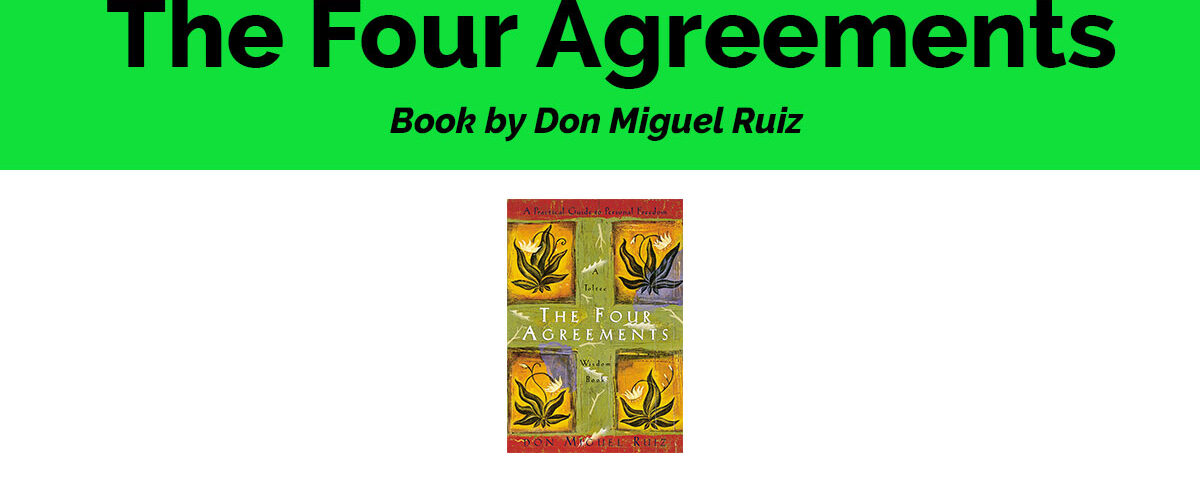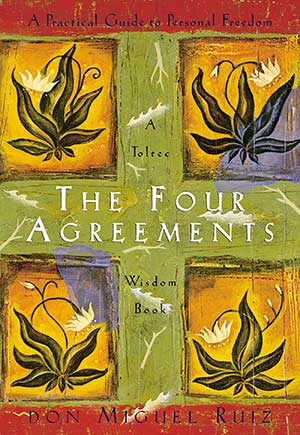
The Four Agreements Summary
The Four Agreements by Don Miguel Ruiz is the first self-help book I have ever read.
I was 15, and my parents bought it for me and my brother for Christmas.
I found so much practical wisdom in the book back then, and I still do 15 years later.
I will share my insights and takeaways in this summary of The Four Agreements.
The Four Agreements Summary
Book Title: The Four Agreements: A Practical Guide to Personal Freedom (A Toltec Wisdom Book)
Author: Don Miguel Ruiz
Publication Date: 1997
My Rating: 8/10
1-Sentence-Summary:
The Four Agreements is a guidebook for personal growth and happiness, presenting four agreements to live by for a more fulfilling life.
Table of contents
Quick Summary of the Four Agreements
One of the things I like the most about the book is that it has no filler pages. The Four Agreements is a compact yet profound guide to personal freedom and a fulfilling life. Through concise and impactful insights, Ruiz distills ancient Toltec wisdom into four transformative agreements that can lead us to a life of authenticity and joy. Let's delve into these agreements and discover the wisdom they hold.

THE FIRST AGREEMENT – Be Impeccable with Your Word
"Be impeccable with your word" might sound straightforward, but the depth of its implications is immense. This agreement urges us to recognize the immense power our words hold. Our intentions behind our words shape the reality we create. Language is a magic tool capable of nurturing dreams or tearing down entire worlds. Ruiz reminds us that the language we use to communicate with others, and ourselves should be guided by positive intent. By respecting the potency of our words, we can reshape our reality and the realities of those around us.
THE SECOND AGREEMENT – Don’t Take Anything Personally
Human beings are inherently sensitive to the opinions of others. Yet, this agreement encourages us to liberate ourselves from the prison of personalizing every remark directed at us. Ruiz asserts that people's judgments and opinions reflect their own realities more than ours. Refraining from taking things personally protects us from emotional poison and drama. This agreement reinforces the idea that we cannot control others' perceptions, but we can control how we react to them.
THE THIRD AGREEMENT – Don’t Make Assumptions
Assumptions often lead to misunderstandings, conflict, and unnecessary suffering. Ruiz's third agreement encourages us to question our assumptions and seek clarity through open communication. He warns against the dangers of assuming we know others' thoughts, motivations, or intentions. This practice saves us from the pitfalls of blaming and reacting emotionally. By breaking free from assumptions, we create a space for understanding and healthy relationships to flourish.
THE FOURTH AGREEMENT – Always Do Your Best
Ruiz's final agreement reminds us that greatness comes from consistently giving our best, no matter the external rewards. It shifts our focus from outcomes to embracing the process itself. When we engage with a life driven by our passion, we unlock our potential. In essence, the agreement highlights that our dedication and hard work are what lead to our accomplishments and overall sense of satisfaction and development.
What Are the Four Agreements: My Personal Insights
The four agreements empower us to lead more purposeful, authentic, and joyful lives.
When you read the book, take a moment to look around and contemplate each agreement in the context of your own life.
By doing so, you will realize the importance of integrating these agreements into your daily interactions and thought patterns.
Below are examples of some of my own reflections on the agreements.
THE FIRST AGREEMENT – Be Impeccable with Your Word
According to Ruiz, you need to realize that the word is your most powerful tool as a human.
Your words can create the most beautiful dreams while also having the potential to shatter them all. It's essential to respect the power of the word and understand how your words can change your reality and the reality of others.
A few days ago, I was at a golf driving range with my dad and my brother. My dad is a passionate golfer, but my brother and I have always leaned toward other sports, leaving us unfamiliar with proper golf techniques.
Dad was patiently giving us pointers on what we were doing wrong. He was happy we were trying the sport he loved.
A dad with a son was next to us at the driving range. The son was still a kid, around 12 years old.
His dad was also giving him pointers, but unlike my dad, he was not patient. If the kid made a mistake, his dad would start yelling at him, asking why he did the opposite of what he was told. I felt sad for the kid; he was trying to make his dad happy and improve, but the more his dad yelled at him, the worse he performed.
His dad did not realize that his behavior did not only impact his performance but probably future performances as well.
He will not look forward to going to a driving range after such an experience, as he will associate golf with his dad yelling at him. As a result, he might avoid playing golf and never improve, which is the complete opposite of what his dad wants.
On the contrary, I enjoyed playing golf with my dad, and I already planned to go with him again.
My dad didn’t make me feel terrible when I messed up a swing. On the contrary, he would motivate me to try again and again to improve.
I was leaving the golf course with a positive mindset and a desire to improve. I even looked up some golf tutorials on YouTube when I got home.
That’s how powerful words are.
Therefore, before you lash out at someone or say something negative, consider the negative implications you will create.
THE SECOND AGREEMENT – Don’t Take Anything Personally
You can't control what others think about you.
Some will agree with you, and some won’t. Some might even call your thoughts silly.
So, what's usually the response? Many people get upset and start defending themselves, trying to prove the other person wrong.
But this usually makes things worse. Remember, everyone has their own thoughts. You don't know why they think the way they do.
You don't need to carry the weight of what others do; just focus on what you do. When you understand and remember this, and don't take things personally, it's like having armor to protect you from hurtful words or actions. This new understanding makes you strong and self-assured.
Imagine you want to start a business online. You've spent a lot of time researching, and you're excited to take the first steps toward making your dream come true.
Then, you talk to your friend about your online business idea. She listens and tells you that your idea is horrible.
You get angry with your friend, argue with her, and then avoid talking to her because you feel she's not supporting you.
But think about it, is all of this necessary? It will create stress and use up the energy that you could have used for your business.
Sure, it would be nice if your friend supported you or gave you helpful advice, but you can't control her thoughts.
Maybe her parents had difficulties with their own online businesses, and that's influencing her perspective. Maybe she's worried about you and doesn't want to see you struggle.
The point is, you don't know exactly why she said what she did.
Don’t take it personally. Don't let others' opinions bring you down.
They live on the same planet yet in a different world formed by their own past and experiences.
THE THIRD AGREEMENT – Don’t Make Assumptions
Have you ever reacted excessively to a situation, only to later discover that your reactions were based on misconceptions?
It happens to all of us. When things don’t go as planned, our minds rush to fill in the gaps with assumptions. For instance, imagine a friend canceling vacation plans at the last minute. The assumption might be that they don't value your time or company, leading to feelings of hurt or frustration.
The "Don’t Make Assumptions" agreement reminds us that these assumptions can often be far from the truth. People's actions and motivations are influenced by a myriad of factors we might not be aware of. Perhaps your friend canceled due to a sudden family emergency, or maybe they've been struggling with their own challenges.
By making assumptions, we allow our minds to craft narratives that might be misleading or outright wrong. This can strain relationships and lead to unnecessary emotional turmoil. Instead, we're encouraged to take a breath and initiate a conversation. When we communicate openly, we bridge the gap between assumption and reality.
Imagine the difference it could make if, instead of jumping to conclusions, you asked your friend what led to the change in plans. By seeking clarity, you dismantle the walls that assumptions build, nurturing understanding and fortifying connections.
The "Don’t Make Assumptions" agreement invites us to be detectives of truth, gathering information through dialogue rather than conjecture. In doing so, we cultivate a culture of empathy and eliminate the pitfalls of misguided assumptions. This agreement empowers us to embrace the unknown with curiosity and transform our relationships through the power of genuine understanding.
THE FOURTH AGREEMENT – Always Do Your Best
No matter the task, always give it your best effort.
We all experience days when things go well and when they don't. That's natural. However, if you consistently strive to give your best, you'll find yourself on a path of growth and self-improvement. This agreement isn't about being perfect every time; it's about consistently approaching tasks with dedication and commitment to continuously bettering yourself.
What truly matters is that you're driven to improve because you enjoy the process, not solely for the sake of rewards. When you attach rewards to your actions, maintaining your best effort over time becomes difficult.
Let me illustrate with a personal example. When I was studying law and preparing for exams, I put in my best effort by thoroughly studying all the textbooks. Of course, passing the exam was a goal, but I wasn't fixated on the outcome. My focus was on understanding the subject matter. If I didn't pass, it meant there was more to learn. This mindset allowed me to approach retaking the exam without feeling discouraged. I knew I had given my best, yet there was room for improvement.
So, do your best. If you stumble, view it as a chance to refine your best. Concentrate on the process, not the end result. Learn to find fulfillment in the effort itself.
Remember the movie 'Forrest Gump'? Forrest gives his best in all he does and doesn't expect rewards from others. By consistently doing his best, his life takes him on incredible journeys, and the universe rewards him abundantly.
Book Review
The Four Agreements by Don Miguel Ruiz is a special book that can change your life.
All the agreements are very practical. You can start implementing them in your life and have a happier life.
Even though all the agreements are straightforward, you will find it hard to follow them all the time. It's like learning a new skill — it takes time and practice. But the more you try, the better you'll get.
The Four Agreements is a short book with big ideas, and if you give it a chance, it might just change the way you see the world.
I have read the book three times, and that's not the final count. I will return to it again because each time I read it, I discover new insights and connections that deepen my understanding. The wisdom within its pages is like a well that never runs dry, offering something valuable with each visit. As I continue to absorb its teachings, I find myself applying its principles to various aspects of my life, creating positive shifts and enriching my journey of personal growth.


